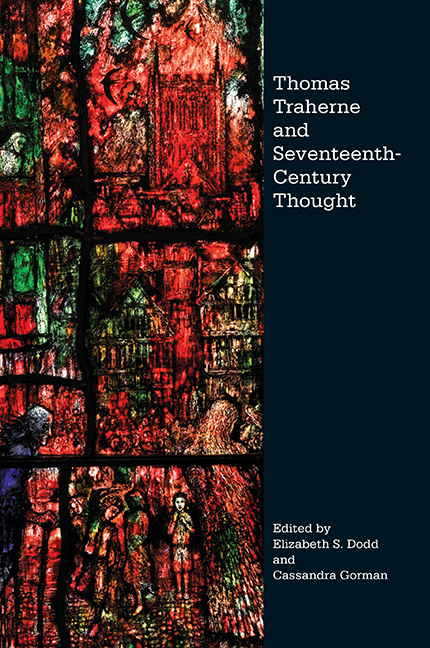Book contents
- Frontmatter
- Contents
- Contributors
- Acknowledgements
- Conventions and Abbreviations
- Foreword
- Introduction: ‘A lover of all Things … An Active ey’ (Select Meditations I.82): Traherne in Context
- PART I PHILOSOPHIES OF MATTER AND SPIRIT
- PART II PRACTICAL AND PUBLIC DEVOTION
- 5 Crossing the Red Sea: The Ceremonial Law, Typology and the Imagination
- 6 Sectarianism in The Ceremonial Law
- 7 Thomas Traherne and the Study of Happiness
- 8 ‘Innocency of Life’: The Innocence of Thomas Traherne in the Context of Seventeenth-Century Devotion
- Afterword by Jacob Blevins
- Chronology of Traherne's Life and Contemporary Intellectual Developments
- Bibliography
- Index
- Index of Biblical References
- Studies in Renaissance Literature
6 - Sectarianism in The Ceremonial Law
from PART II - PRACTICAL AND PUBLIC DEVOTION
Published online by Cambridge University Press: 05 July 2016
- Frontmatter
- Contents
- Contributors
- Acknowledgements
- Conventions and Abbreviations
- Foreword
- Introduction: ‘A lover of all Things … An Active ey’ (Select Meditations I.82): Traherne in Context
- PART I PHILOSOPHIES OF MATTER AND SPIRIT
- PART II PRACTICAL AND PUBLIC DEVOTION
- 5 Crossing the Red Sea: The Ceremonial Law, Typology and the Imagination
- 6 Sectarianism in The Ceremonial Law
- 7 Thomas Traherne and the Study of Happiness
- 8 ‘Innocency of Life’: The Innocence of Thomas Traherne in the Context of Seventeenth-Century Devotion
- Afterword by Jacob Blevins
- Chronology of Traherne's Life and Contemporary Intellectual Developments
- Bibliography
- Index
- Index of Biblical References
- Studies in Renaissance Literature
Summary
Little thus far has been written about The Ceremonial Law, Traherne's curtailed epic poem in heroic couplets. The discovery of the poem was reported in the TLS on 7 November 1997; Laetitia Yeandle of the Folger Shakespeare library found the manuscript listed as an anonymous poem from the 1680s (Yeandle and Julia Smith subsequently redated the poem to the 1660s). The Ceremonial Law had been in the library since the summer of 1958, bought from H. A. Hammelmann of Suffolk. This recent find, however, has left scholars with little time to reflect upon its contents in comparison to the manuscripts discovered in the late nineteenth century. Besides its late discovery, the reasons for the lack of attention to The Ceremonial Law are several: the bulk of the Traherne manuscripts reside at the Bodleian and the British Libraries. The Ceremonial Law and Select Meditations are the outliers, in the United States. Furthermore, the manuscript of the poem was only published for the first time in 2014, in the sixth volume of Jan Ross's The Works of Thomas Traherne. In addition to these logistical reasons, The Ceremonial Law maintains in some ways a different focus from other more familiar works by Traherne, and readers are still considering its place in his canon.
Traherne's distinctively Protestant use of typology in The Ceremonial Law, I will argue, allows him to experiment with sectarian ideas far afield from the Anglican orthodoxy scholars have read in his work. The current thinking that Traherne wrote the poem in the 1660s further suggests a comparison to another manuscript dated to the 1660s, the Select Meditations. Scholars have drawn conclusions about Traherne's politics based upon perceived levels of orthodoxy and loyalty to the national church, and therefore to the royalist cause, that they read especially in Select Meditations. Yet Traherne's extreme Protestant views in The Ceremonial Law concerning individual Christians’ agency, their ability to become one and the same as the Deity – with everyone serving as a king on Earth and in Heaven – suggests an affinity with more radical Protestant sects, and with politics nearer to sectarian beliefs. I will argue that we expand our understanding of Traherne's political and ecclesiastical loyalties when we read his work anew through the lens of his engagement with typology in The Ceremonial Law.
- Type
- Chapter
- Information
- Thomas Traherne and Seventeenth-Century Thought , pp. 130 - 153Publisher: Boydell & BrewerPrint publication year: 2016



